Review: Rooted in Familial Warmth, MUSIKAL KELUARGA CEMARA Blossoms with Spectacle
The show runs on June 21 to July 15 at Ciputra Artpreneur

Musikal Keluarga Cemara (“Cemara Family the Musical”, with Cemara literally meaning pine tree) held its gala night performance on Wednesday, June 19th at Ciputra Artpreneur ahead of its opening night on Friday, June 21st. This musical, by Visinema and Indonesia Kaya in collaboration with TEMAN, adapts the quintessential Indonesian family story of Keluarga Cemara for the stage. The show is planned to be one of the longest-running shows in recent years, running from June 21 to July 15 for a total of 30 shows in 25 days.
Musikal Keluarga Cemara holds the distinction of being the first stage musical produced by the production house Visinema, a power player in the film industry. The show is produced by Cristian Imanuell, Billy Gamaliel, and Chriskevin Adefrid with Anggia Kharisma and Herry B. Salim as executive producers.
Arswendo Atmowiloto’s story is adapted for the stage by scriptwriters Yemima Krisantina (known for the movies Eggnoid: Love & Time Portal and Nanti Kita Cerita Tentang Hari Ini) and Widya Arifianti (who was in the writing team for Musikal Petualangan Sherina and Musikal Cek Toko Sebelah).
Longtime theater director Pasha Prakasa (Payung Fantasi, Musikal Masih Ada, and The Addams Family) led the creative team, with music composed by Ifa Fachir (who also composed the award-winning soundtrack of the 2018 film version) and Simhala Avadena (vocalist of the Numata).
Musikal Keluarga Cemara revolves around the struggles of a family: the parents Abah and Emak, and their daughters Euis and Ara. The musical starts with the story of Abah’s youth as a demonstrant protesting the rising prices, rapidly followed by his first meeting with Emak, their courtship, marriage, and the birth of Euis, in almost dizzying speed.
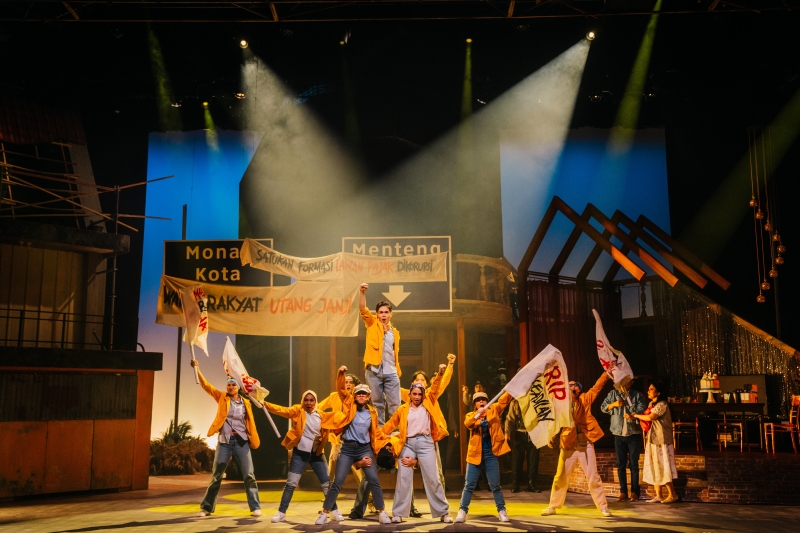
It then brings us to the current day as Euis celebrates her 13th birthday. Misfortune strikes at the party as Abah comes home, having lost both his job and his house due to a workplace problem. The family of four is then forced to move to the countryside and live at the old house left by Abah’s late parents.
This sudden change proves to be a challenge. Abah struggles to find a new job in such a rural area. Emak tries to earn some supplementary income by selling opak, a traditional snack. Euis has trouble letting go of her old life and friends back in the city. And Ara can’t play the part she wants in the school play as they cannot afford the costume budget.
However, not everything is as bad as it seems. Their new neighborhood proves to be a cheerful and supportive one, dominated by two rivaling groups: the working men of 3K (Kuli Kuli Klub) and the neighborhood mother association EEA (Emak Emak Asik). The men of 3K helps Abah find a job as a construction laborer, while the women of EEA assists Emak with making opak. Similarly, Euis’s new friends at the school help her sell opak.
One day, as Abah is working on the construction site, he falls from the third floor and breaks his leg. Now unable to work, Abah is forced to sell his house to land magnate Tante Pressier, who plans to build a resort there. Euis takes this decision hard, as she has grown fond of their new friends, and tries to take the house certificate away with Ara’s help. Their little ploy enrages Abah, who calls Euis out as the one who complained the most about their situation. After a heart-to-heart, the two reconcile.
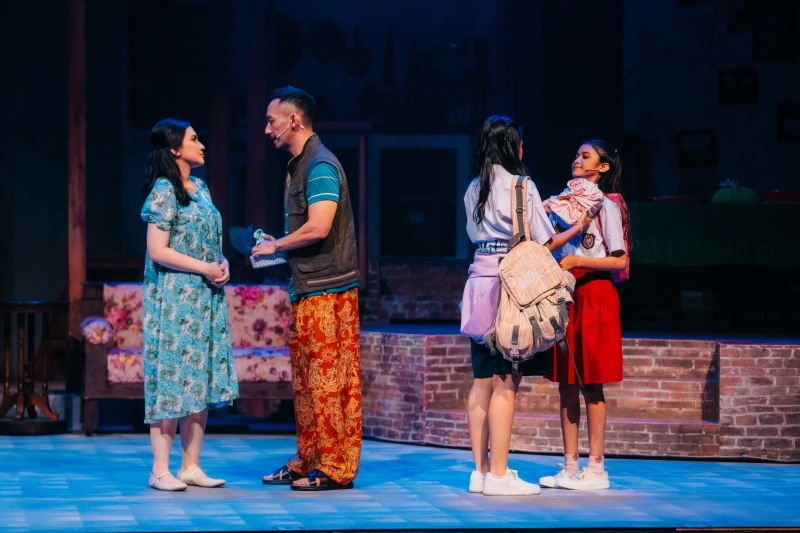
It’s time for Euis’s birthday again. The whole community comes together to celebrate, including Euis’s friends from school. Unexpectedly, Emak— now heavily pregnant with the couple’s third child — gives birth at home, with the assistance of the whole village.
Later still, the family calls for their friends and neighbors to gather at their home. The guests expect this to be the family’s farewell as they move back to the city. But the Cemara family has a surprise: they’re there to stay. To mark the occasion, the family (with the help of Euis’s friends) puts on a little show, starring Ara in her pine tree costume narrating their family’s tale.
The producers of Musikal Keluarga Cemara had stated that they envisioned the show to be the first musical for many of the audience members. A reasonable goal, as musical theater is still a very niche art form in Indonesia, and the recognizable IP and considerable marketing budget would surely help it reach new audiences.
As, ostensibly, many people’s first musical, Musikal Keluarga Cemara does a lot of things very right. First and foremost, the production design is gorgeous (and, at times, breathtaking) and a character of its own.
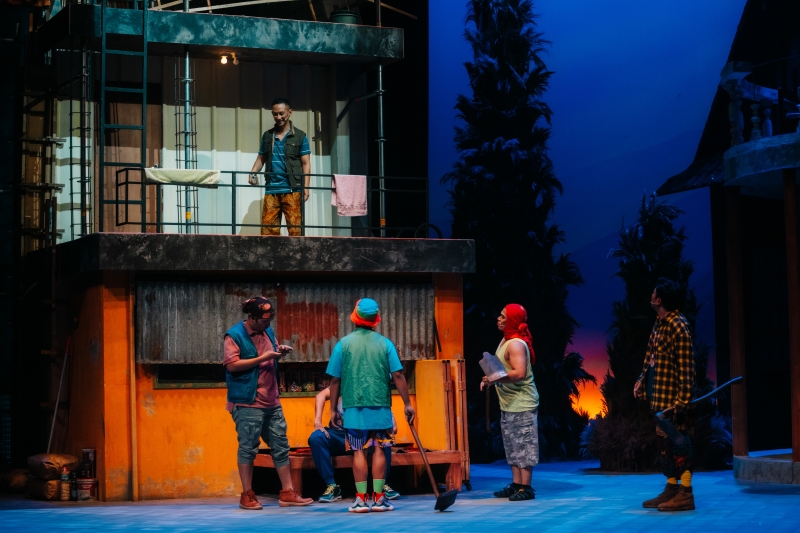
The set is mostly static, with a big, two-story centerpiece that serves as the family’s house, alongside a smaller, yet taller, building set to its right. But everything is designed so well, with beautiful details to be found in every corner, that they’re a visual delight throughout. The main building set, in particular, has stylized proportions and roundedness that imbue it with a fairytale-like charm. And as a side note, the production also decorated the proscenium with knick-knacks and toys.
The characters, especially the ensemble members playing the villagers, are clad in an eccentric yet stylish style that (as one character points out) clashes patterns and colors in highly sophisticated and coordinated ways. Even with the dozens of ensembles on stage, you can easily tell each character’s personality and allegiance as their clothing helpfully supports their characterization.
And the lighting design is out of this world. Most of the time, it is beautifully and subtly atmospheric. It masterfully blends color, lending texture and mood to the world. Nothing is ever flat or aimless. But it can pop out when it needs to be, playing with moving patterns, projection on screens, dramatic spotlight, and even dreamlike, luminescent neon accents. It’s a master class in lighting a show and, if Indonesia had a Tony Awards of our own, would surely be a lock-in for this year’s winner for Best Lighting Design in a Musical.
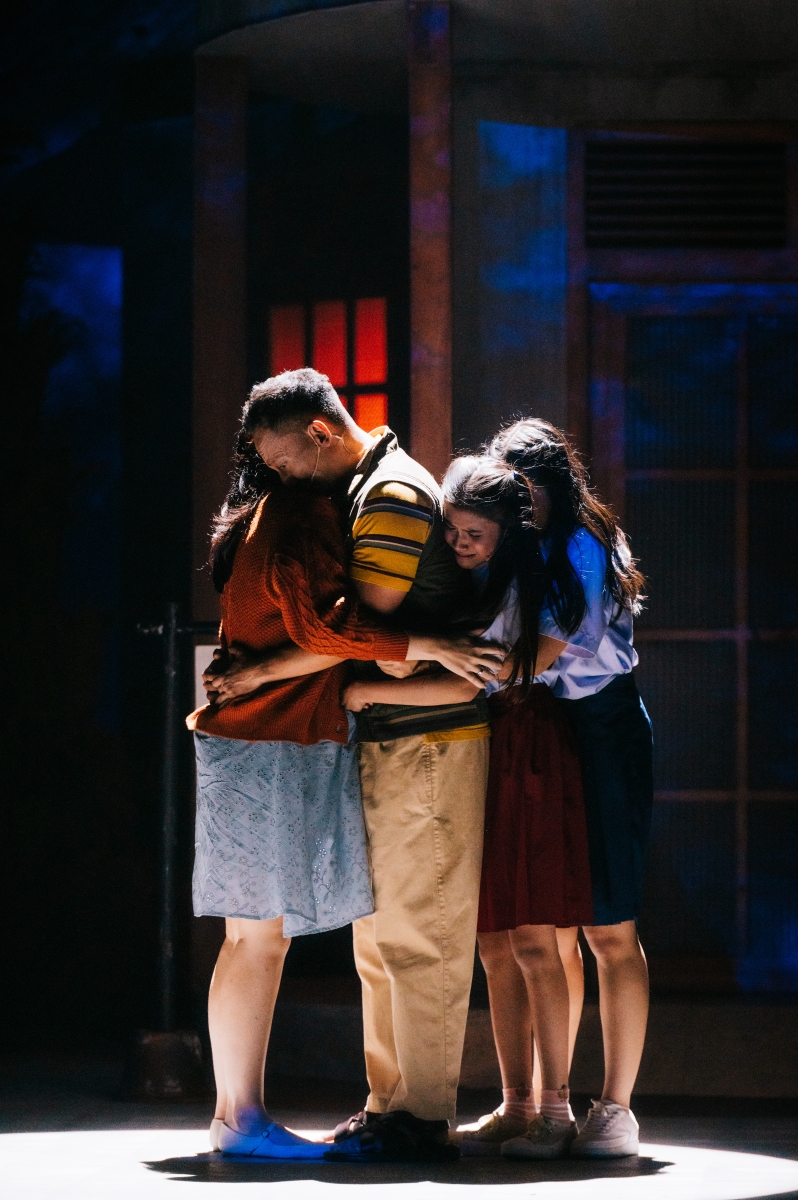
This production design serves as the setting for the many spectacles that the creative team behind the show has meticulously designed. The show’s surprises come in many forms, from a moving platform, laugh-out-loud jokes and physical comedy moments, the usage of props, big dance numbers, costume changes, even things as little as an operatic vocal performance that lasts perhaps one bar. The choreography is exciting, incorporating both traditional Indonesian elements, contemporary musical theater moves, and so much more. It especially shines when it makes good use of the large ensemble, making for a lively and joyous stage. It’s a show that can surely delight both newcomers and diehard theater fans (though perhaps at different moments), a testament to the director and his team..
That is not to say that the show is merely farcical entertainment. The heart of the story is in the emotional relationship between its main characters and, although not without its flaws (which I will get into later), still comes out brilliantly, especially in the second act. The most touching moments in the show are when two characters get to truly communicate and connect heart-to-heart, to ease their pains and to reassure each other of their love. In these moments, the show truly embodies the familial love that has made Arswendo Atmowiloto’s story so resonant to generations of Indonesians.
Of course, neither of the spectacular nor the emotional scenes would land as well if not for the show’s capable performers. When the cast was announced a couple months ago, it became immediately obvious that most of Jakarta’s musical theater up-and-comers are involved in some capacity. And, combined with the show’s intense rehearsal schedule, it is not at all surprising that the cast put on a world-class performance.
For the gala show, the role of Abah is played by Simhala Avadana, Emak by Galabby, Euis by Aisyah Fadhila, and Ara by Quinn Salman. Simhala’s Abah has a charming quirkiness to him and sings the songs well. However, his mannerism and accent are not always the most consistent throughout the show, but nothing that can’t be improved upon as the show goes on.
Meanwhile, Galabby really brings a soulful performance to Emak, particularly when she sings, as her powerful voice stands out, masterfully imbuing each lyric with tangible emotion. The only downside to her role is that there is little chance for Galabby to really show off her capability as a dancer. Still, it is such a treat to watch her play a type of character she hasn’t played so often before, and she pulled it off beautifully.
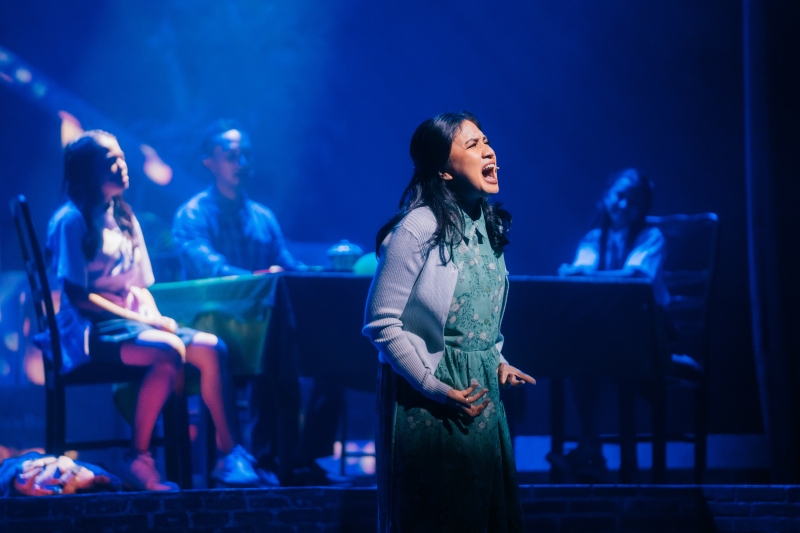
The sisters have a great sibling energy between them. Aisyah Fadhila is radiating energy and joy as Euis that makes the audience want to root for her, making it all the more heartbreaking when she has to deal with her insecurities regarding puberty and relationships. Quinn Salman plays the younger sister perfectly, adorable yet serving as the emotional anchor that grounds the family during their harshest storms. However, out of the four, her role has the least material to really dig into; it would’ve been interesting to see how far she can explore this character’s struggles.
Of course, the show has dozens of ensemble members and it utilized them well. Each ensemble member puts in a performance worthy of being a lead role of their own. The energy is impeccable, the dances are precisely synchronized, each character oozing with charm and might be somebody’s favorite.
When the ensemble members are front and center, the show leans more into the comedic side. Although it might not be narratively succinct, it is just so thoroughly enjoyable. Even watching from the farthest row on the balcony, I could still feel their unbridled joy playing these roles. The ensemble cast brings such pure energy that it was impossible not to smile together with them.
And then there’s the matter of the story and music. As a musical, the two are inseparable. If the show has any noticeable gaffe, it is in the way the story is structured. Adapting a slice-of-life story into a stage musical must have not been an easy task, and, unfortunately, it shows.
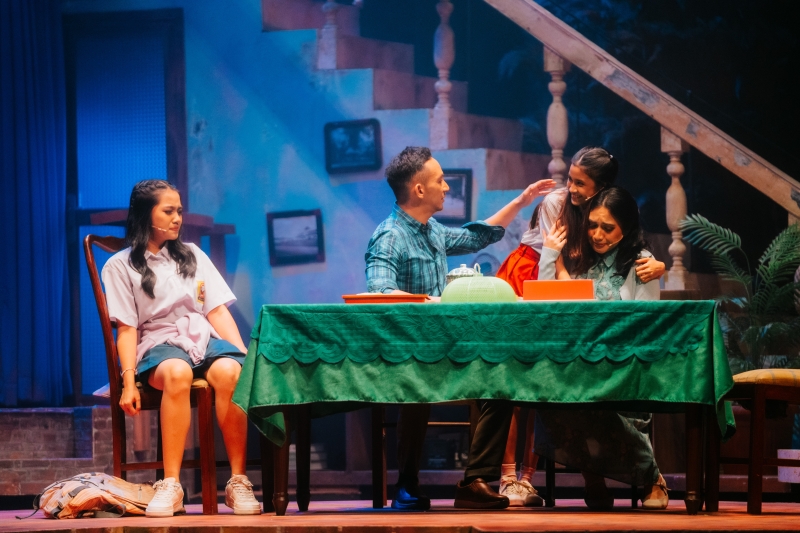
The show tries to tell so much yet it still leaves me with the feeling that some aspects weren’t given enough time nor focus. For one, the opening scene that shows Abah and Emak’s past through different milestones so rapidly comes off as rather gratuitous; not much is gained from portraying everything in painstaking detail, and it is as if the script’s checking boxes from their list of romantic events: first meeting, flirtation, marriage, moving into their house, having a child.
Then, there is the matter of hook, focus, and pacing. The show doesn’t provide us with a strong main narrative hook that keeps us wanting to see the next scene, to wonder and speculate of what the characters will do. In staying very close to the original story and its overall relaxed tone, it doesn’t make the transition into the from of stage musical very smoothly.
Second, by trying to share the spotlight with nearly all the family members (and some of the ensemble members), it makes each subplot just slightly shallow. For example, Euis’s potential conflict at her new school, with her being a transfer student from the city with a whole different upbringing, doesn’t go anywhere. Her new friends very quickly welcome her and help her sell opak. And even when there’s potential for conflict with the teacher forbidding students from selling things at school, she changes her mind in a matter of seconds. Conflict averted, even though it would’ve been more satisfying to see her overcome challenges and grow from it.
The same goes with basically all the conflict in the story. Abah finds a new job as a construction worker and his new crewmates are very supportive. The ladies help Emak with making opak. And when Emak feels guilty for bearing another child (although it takes two to tango, so to speak), of course Abah is fully loving and understanding. And Ara quickly gives up her dream of playing a princess to play a tree , Abah helps her make the costume, and then she plays an adorably flexible pine tree.
Even the conflict with Abah selling the house’s certificate, which has potential to be the biggest source of conflict, goes nowhere after the Abah and Euis make up with each other. Abah just cancels the transaction and Tante Pressier seemingly has no qualms with it, despite her previous apparent anger at Euis’s little antics. In fact, she now wants to invest in the family’s opak business.
And finally, the pacing is a bit off both on a macro and micro scale. On a macro scale, Act 1 ends around the time the family finally settles in their new home. But, as mentioned, everyone is so welcoming and hospitable, they’re not in any immediate (or at least apparent) trouble, and there is basically little tension to be found. Then, as mentioned, Act 2 quickly introduces a bunch of small problems and solves them just as quickly. On a micro scale, some of the songs get their flow interrupted as the song changes between different perspectives or even location in the middle of the song. Of course, this is not a technique unknown to musical theater. But, typically, the song would have a melodic thoroughline that keeps it feeling like a unified song. And some other songs just don’t have enough intro, bridge, or outro that they feel abrupt or unfinished.
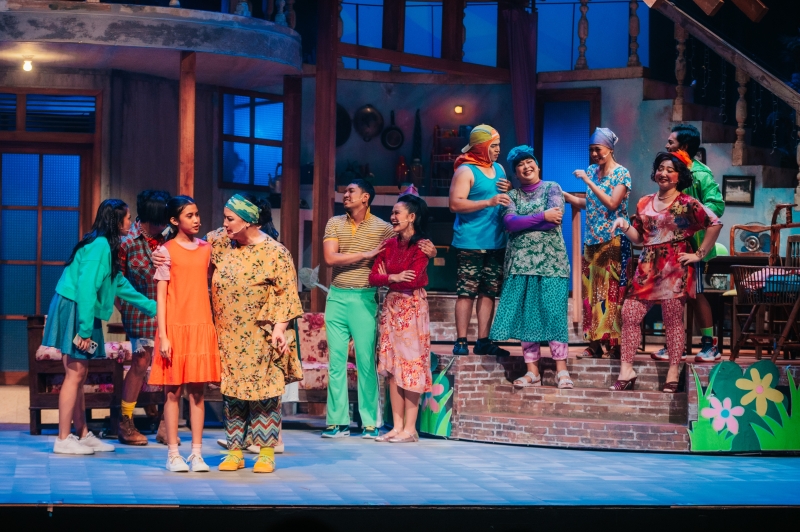
That is not to say that the music is bad, but the opposite. The songs, by Ifa Fachir and Simhala Avadena, are generally very good when they can go uninterrupted. For example, the song that the musical uses the most in its marketing material, ‘Bahagia Yha’, is very catchy and exuberant. I believe it has the potential to be the next big Indonesian musical theater song, due to how well-written the hook is. Other songs that feel complete, like ‘Opak Party’, the duet between Abah and Euis, duet between Euis and Ara, or Emak’s heart-wrenching solo, are all good or even excellent. It’s a shame not all the songs feel as complete.
The story’s hesitance to complicate the characters’ struggles, as well as the somewhat messy structure, makes Musikal Keluarga Cemara just slightly dramatically unsatisfying. Just like a tree, perhaps a bit of trimming is necessary. But, that being said, I don’t think it ultimately matters to most of the audience.
People who come to Musikal Keluarga Cemara to have a good time will be more than satisfied.
The show is a true triumph in so many ways. The actors are stupendous and know how to work a crowd, but also genuine and heartfelt when they need to be. Some of the songs are really catchy and will stay with you for days. The artistic direction is simply unmatched, a true feast for the eyes. The show also runs really well, with very few and minor technical mishaps. And, although the story might not be perfect from a dramaturgical lens, it’s still familiar and emotionally resonant.
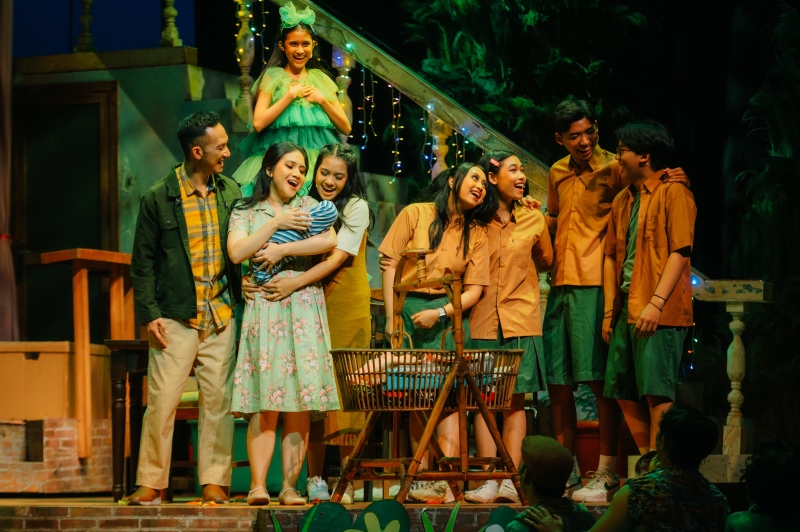
Musikal Keluarga Cemara is a great show to watch with your family. It’s very accessible to everyone, immensely enjoyable, surprisingly affordable, and will remind you that the most precious treasure is, indeed, our family.
Full cast list:
• Taufan Purbo (Abah/Keluarga Bahagia)
• Andrea Miranda (Emak/Keluarga Bahagia)
• Amira Karin (Euis/Keluarga Bahagia)
• Fazka Bahanan (Ara/Keluarga Bahagia)
• Gaftan Rifqi Erwin Ptura (Deni)
• Mutiara Azka (Rindu)
• Kalya Islamadina (Ima)
• Benedictus Benfilio Prihadi (Andi)
• Sita Nursanti (Ceu Salmah)
• Bima Zeno (Romli)
• Louise Monique (Tante Pressier)
• Astryovie (Ceu Kokom)
• Venytha Yoshiantini (Cici)
• Putri Indam Kamila (Angelica)
• Nisa Haryanti (Nurita)
• Aldafi Adnan (Telmi Yahya)
• Ricky Alvano (Asep Bisep)
• Jeremiah Purwoto (Dede)
• Kezia Haniel (Jovi)
• Tessa Latuheru (Regina)
• Neala Vangelin (Peggy)
• Ayu Gurnitha (Marissa)
• Barly Armandita (Male Swing 1)
• Mumu Harmoun (Male Swing 2)
• Dianya Nareswari (Widya/Female Swing 1)
• Clarissa Theophilia (Tuti/Female Swing 2)
• Christoffer Nelwan (Damar)
• Fadli Hafizan (Fajar/Tigor)
• Ery Christian Kumendong (Dedi Debt Collector)
Reader Reviews

Videos
